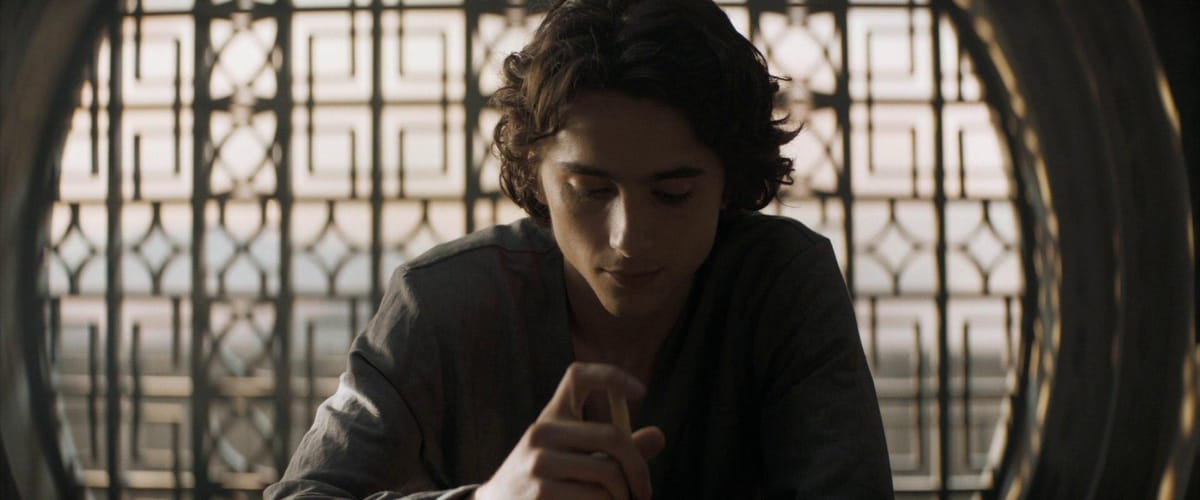The age of Arrakis has begun.

DUNE: PART ONE is Denis Villeneuve’s attempt to turn a famously “unfilmable” novel into myth — not by simplifying Frank Herbert’s universe, but by rendering it with the gravity of scripture. The result is a sweeping, hypnotic epic that treats science fiction as prophecy rather than spectacle. Villeneuve doesn’t rush. He builds Arrakis grain by grain, ritual by ritual, until the world feels ancient long before Paul Atreides ever sets foot on its sands.
Timothée Chalamet’s Paul is a different kind of chosen one — not triumphant, but terrified. Chalamet plays him with quiet dread, a boy raised on destiny and finally realizing what it demands of him. His visions don’t reassure; they warn. He sees blood, war, fanatical armies chanting his name — the cost of a future he never asked for. Chalamet captures the tragedy of someone groomed for greatness in a universe where greatness is indistinguishable from violence.
Rebecca Ferguson’s Lady Jessica is the film’s emotional and thematic core. Villeneuve leans into the Bene Gesserit mystique, portraying Jessica as a woman trained to manipulate empires but terrified of the consequences of loving her own son. Ferguson’s performance is all trembling strength — a mother torn between obedience to an ancient order and the instinct to protect Paul from the destiny she helped create. Their scenes together hum with tension: love and fear braided into prophecy.
Villeneuve’s worldbuilding is staggering. The production design imagines a future built on the ruins of many pasts: Gothic shadows on Caladan, brutalist geometry on Giedi Prime, monolithic ships that move like extinct gods waking from sleep. Everything feels heavy, ritualistic, drenched in history. Hans Zimmer’s score deepens the myth: throat singing, choral blasts, and rhythms that sound like the heartbeat of a planet that refuses to be conquered.
Arrakis itself becomes the film’s true protagonist. Villeneuve treats it with religious awe — the rippling dunes, the blinding light, the impossible scale of the sandworms. The first worm encounter isn’t filmed as a monster cameo; it’s filmed as revelation. Nature as deity, spice as sacrament. Fremen culture as something deeper than the empire’s imagination can comprehend.
The film’s political critique remains sharp. Herbert’s warnings about resource extraction, colonial arrogance, messianic manipulation, and environmental devastation are not softened. They’re sharpened. The Harkonnens aren’t just villains; they’re the logical endpoint of empire. The Atreides aren’t saviors; they’re simply the next empire in line. Villeneuve refuses to flatter the notion of “good colonizers,” and that clarity gives the story its moral weight.
By the time DUNE: PART ONE ends — abruptly for some, perfectly for others — the film has already done its job. It hasn’t given us resolution; it’s given us inevitability. Paul isn’t the hero yet. He’s the spark of a fire that will burn far more than he intends. The final shot isn’t triumph — it’s surrender, a boy stepping into the desert that will turn him into something feared, worshipped, and catastrophic.
Villeneuve delivers a science-fiction epic that feels carved from myth and sand — vast, patient, overwhelming, and precise. A prophecy told in whispers before it becomes a war cry.




